Complex diagnostics of early gastric cancer associated with Helicobacter pylori infection in the adult population of Siberia
DOI:
https://doi.org/10.15419/bmrat.v8i12.709Keywords:
Adenocarcinoma, chemiluminescent activity, chronic atrophic gastritis, early cancer, early diagnosis, enzyme activity, monocytesAbstract
Background: Most researchers point to a decrease in immunity indicators in patients with gastric cancer. At the same time, there are ambiguous interactions between tumor growth and the functioning of the immune system. Identifying gastric cancer patients at an early and curable stage of the disease is essential if the mortality rates for this disease are to decrease. The only way to prevent the development of gastric cancer is the potential reversibility of precancerous changes in the gastric mucosa. The early diagnosis of chronic atrophic gastritis is a preventive measure and it should be carried out in both the presence and absence of the symptoms of dyspepsia.
Methods: A total of 299 blood samples were collected, inclusive of 98 gastric cancer patients, 104 healthy controls, and 97 patients with chronic atrophic gastritis. An evaluation of spontaneous and induced chemiluminescence (CL) was carried out for 90 minutes using a 36-channel biochemiluminometer "BLM — 3607" (Russia), and an Olympus fluorescence microscope was used for cell counting.
Interpretation & conclusions: Our study showed the significance of the parameters, specifically the maximum intensity of spontaneous (Ispont) and induced chemiluminescence (Iindus) of the neutrophils and monocytes, the indices of granulocytic and monocytic phagocytosis, malondialdehyde (MDA), and the ratio of the activity of the enzyme superoxide dismutase to glutathione/CAT ratio superoxide dismutase to glutathione peroxidase (SOD/GPO) in the diagnosis of early gastric cancer. Using the threshold values of the proposed criteria in the screening of the adult population, it is possible to form a group that is at a high risk of developing early gastric cancer and to achieve a decrease in the mortality and disability rates in the population of Siberia. This is as well as allowing for the choosing of a more personalized therapy for the patients at a high risk of developing early gastric cancer.

Published
Issue
Section
License
Copyright The Author(s) 2017. This article is published with open access by BioMedPress. This article is distributed under the terms of the Creative Commons Attribution License (CC-BY 4.0) which permits any use, distribution, and reproduction in any medium, provided the original author(s) and the source are credited.
